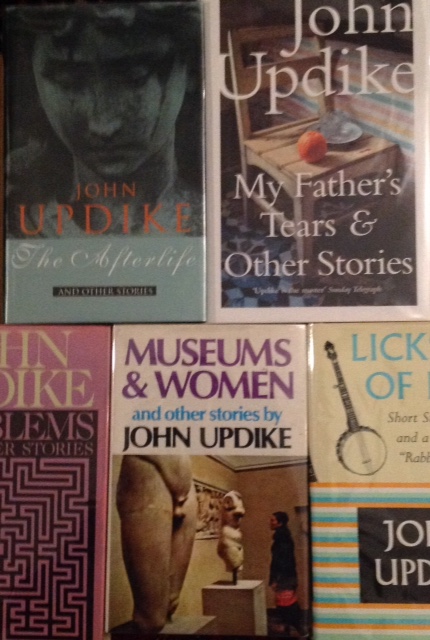Inspiring Older Readers
 posted on 10 Mar 2016
posted on 10 Mar 2016
Updike’s short stories
By the time he died, aged 76, in January 2009, John Updike’s position in the pantheon of great American writers was not unchallenged. His extraordinary, almost Victorian industry – a book a year, and some of them, such as his prose collections, were huge books of well over a thousand pages – was beyond question, but his grip on the Great American Novel was thought by some to be weakening. Not stalled, perhaps, but coasting.
Perhaps we had simply become over familiar with the man and his never-ending work, and with this familiarity a little contempt became mixed. His themes – sex, family, marriage and its dissolution, suburbia, ageing, love and the loss of love, and especially the ‘swinging’, wife-swapping extravagances of liberated middle class suburbanites in the 60s – were no longer fashionable. Perhaps no longer even up-to-date. Updike’s time had come and gone.
But his industriousness, the outpouring of the marvellous, supple, precise, flowing prose that he could, it seemed, produce on any subject at any time, continued. If sometimes his latest novel was a little lacklustre, this could be forgiven.
Updike talked about America in a voice – and from a perspective – unlike any other writer’s. His was the genuine voice of the middle class professional, weighted with responsibility, clinging to a frayed religion, dragged down by school fees and medical bills, chastened by infidelities and occasionally gross misconduct, increasingly aware – but perhaps unafraid – of mortality, awake to the beauty and melancholy of life and ageing. There was always something irreducibly adult about his tone – and I didn’t always like it. It could be magisterial, prosperously grown-up. At times it was like being lectured by a savvy real estate agent or a self-assured corporate executive. Certainly, it was never hip; it was never ‘street’. It was always the voice of the insider, not the outsider.
I dipped into – and out of – the novels, finding some of them unconvincing and horribly dated (the Bech books), some of them clumsy (Terrorist), some of them wonderful (three out of the four Rabbit books: I thought the second volume, Rabbit Redux, a chore to read).
And then gradually along the way I began to discover the short stories, and I wouldn’t be surprised if in another fifteen or twenty years it is on these that Updike’s reputation comes primarily to rest.
At their best, the short stories are magnificent, and the very best are masterclasses in what the form can achieve. They rarely fall below a standard of excellence and their facility can sometimes be almost overwhelming – apparently so easily done that you have to read them twice in order to see both the effort and the skill that has shaped them.
There are more than a dozen volumes of short stories, although this allows for some recycling – at least two or three of these are anthologies or selections – and nestled as they are within an output of over sixty books it can be difficult to know where to start.
I’ll just single out three volumes. There are two later volumes that should on no account be missed – The Afterlife & Other Stories (1994), which contains the great story The Sandstone Farmhouse, and his final collection, published posthumously, My Father’s Tears & Other Stories.
Both of these collections are highly autobiographical, unflinchingly engaged with ageing and mortality – and especially with the ageing and death of parents. These late stories offer unparalleled riches, at times (it has been said) almost too rich. Of the later volume I remember one reviewer (Simon Baker in The Observer) saying that occasionally some of the stories “do not have sufficient plot or purpose to match the art of their construction”, and I do not deny this but believe it is largely a matter of the reader’s mood. Read in the wrong mood (or perhaps read too many at a time), one might feel this; but read in the right mood, such reservations are simply swept aside by the art and construction of these masterpieces.
The Maples Stories collects eighteen earlier stories that chart the life, marriage, divorce and ageing of Richard and Joan Maple, right from their earliest days together (in the marvellous Snowing in Greenwich Village). Somehow, reading the narrative arc presented here is so emotionally powerful, so satisfying, and offers such an inexhaustible mother lode of that Updikean prose, that it is possible to believe that the short story form is being renewed and reinvigorated before your eyes. A generation of American history – personal and public – seems caught in all its dense, palpable particularity.
Some claim much earlier volumes – such as Pigeon Feathers, his first short story collection – as being at the apex of Updike’s achievement; others prefer the Olinger stories, named for the Pennsylvania town of Olinger (long ‘o’, hard ‘g’, according to Updike) which features in all of them, along with David Kern, recognisably an Updike alter ego. Rest assured that whatever period or style or vintage of Updike stories you explore, you will find something that leaves you gasping.
Alun Severn
March 2016